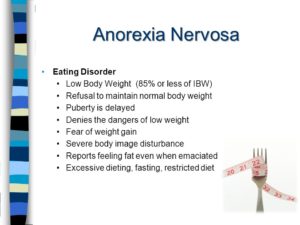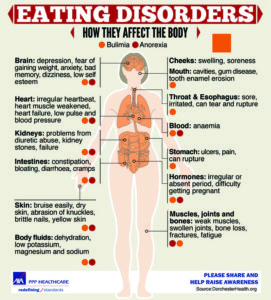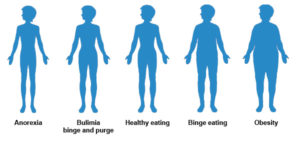Anorexia nervosa is an eating disorder that causes people to obsess about their weight and the food they eat. People with anorexia nervosa attempt to maintain a weight that’s far below normal for their age and height. To prevent weight gain or to continue losing weight, people with anorexia nervosa may starve themselves or exercise excessively.
Anorexia (an-oh-REK-see-uh) nervosa isn’t really about food. It’s an unhealthy way to try to cope with emotional problems. When you have anorexia nervosa, you often equate thinness with self-worth.
Anorexia nervosa can be difficult to overcome. But with treatment, you can gain a better sense of who you are, return to healthier eating habits and reverse some of anorexia’s serious complications.
Bulimia (boo-LEE-me-uh) nervosa, commonly called bulimia, is a serious, potentially life-threatening eating disorder. People with bulimia may secretly binge — eating large amounts of food — and then purge, trying to get rid of the extra calories in an unhealthy way. For example, someone with bulimia may force vomiting or do excessive exercise. Sometimes people purge after eating only a small snack or a normal-size meal.
Bulimia can be categorized in two ways:
- Purging bulimia. You regularly self-induce vomiting or misuse laxatives, diuretics or enemas after bingeing.
- Nonpurging bulimia. You use other methods to rid yourself of calories and prevent weight gain, such as fasting, strict dieting or excessive exercise.
However, these behaviors often overlap, and the attempt to rid yourself of extra calories is usually referred to as purging, no matter what the method.
If you have bulimia, you’re probably preoccupied with your weight and body shape, and may judge yourself severely and harshly for your self-perceived flaws. Because it’s related to self-image — and not just about food — bulimia can be difficult to overcome. But effective treatment can help you feel better about yourself, adopt healthier eating patterns and reverse serious complications.
Anorexia signs and symptoms may include:
- Refusal to eat and denial of hunger
- An intense fear of gaining weight
- A negative or distorted self-image
- Excessive exercise
- Flat mood or lack of emotion
- Irritability
- Fear of eating in public
- Preoccupation with food
- Social withdrawal
- Thin appearance
- Trouble sleeping
- Soft, downy hair present on the body (lanugo)
- Menstrual irregularities or loss of menstruation (amenorrhea)
- Constipation
- Abdominal pain
- Dry skin
- Frequently being cold
- Irregular heart rhythms
- Low blood pressure
- Dehydration
Bulimia signs and symptoms may include:
- Eating until the point of discomfort or pain, often with high-fat or sweet foods
- Self-induced vomiting
- Misuse of laxatives, diuretics, or enemas after eating.
- Excessive exercise
- An unhealthy focus on body shape and weight
- A distorted, excessively negative body image
- Low self-esteem
- Going to the bathroom after eating or during meals
- A feeling that you can’t control your eating behavior
- Abnormal bowel functioning
- Damaged teeth and gums
- Swollen salivary glands in the cheeks
- Sores in the throat and mouth
- Dehydration
- Irregular heartbeat
- Sores, scars or calluses on the knuckles or hands
- Menstrual irregularities or loss of menstruation (amenorrhea)
- Constant dieting or fasting
- Possibly, drug or alcohol abuse. Also Being preoccupied with your body shape and weight , living in fear of gaining weight. It is necessary to help others, not only in our prayers, but in our daily lives.



